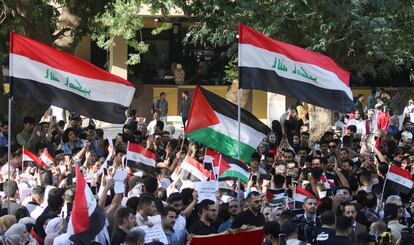Drone attack on base hosting US troops intercepted in Iraq, heightening fears of a broader conflict
The Islamic Resistance in Iraq, an umbrella group of Iranian-backed militias, claimed responsibility for the attacks and said it ‘heralds more operations’ against the ‘American occupation’

Two drones launched at a base hosting U.S. troops in western Iraq were intercepted Wednesday, a U.S. defense official said. Hours later, an Iraqi militia announced it had launched another drone attack on a second base. No injuries were reported in either incident.
The Islamic Resistance in Iraq, an umbrella group of Iranian-backed militias, issued a statement afterward claiming responsibility for the two attacks and saying it “heralds more operations” against the “American occupation.” The salvos came at a time of increasing tension and fears of a broader regional conflict in the wake of the latest Hamas-Israel war.
Since the beginning of the war on Oct. 7, much attention has been focused on Hezbollah, the powerful Hamas ally across Israel’s northern border in Lebanon, and its formidable arsenal. The group has traded so-far limited strikes with Israel on the border in recent days.
But Iranian-backed militias in Iraq have also threatened to attack U.S. facilities over American support for Israel. “Our missiles, drones, and special forces are ready to direct qualitative strikes at the American enemy in its bases and disrupt its interests if it intervenes in this battle,” Ahmad “Abu Hussein” al-Hamidawi, head of the Kataib Hezbollah militia, said in a statement last Wednesday. He also threatened to launch missiles at Israeli targets.
Following Tuesday night’s blast that killed hundreds at a hospital in Gaza, the group issued another statement in which it blamed the U.S. and its support for Israel for the catastrophe and called for an end to the U.S. presence in Iraq. Hamas has said the explosion in Gaza was from an Israeli airstrike, while Israel has blamed a misfired rocket by Palestinian militants. “These evil people must leave the country. Otherwise, they will taste the fire of hell in this world before the afterlife,” the statement said.
A U.S. defense official, who wasn’t authorized to comment to the media and spoke on condition of anonymity, confirmed the attack on the al-Asad military base in western Iraq.
Tashkil al-Waritheen, one of the Iranian-backed militias making up the larger group, claimed responsibility in a statement for a second drone attack, which it said had targeted the al-Harir airbase in northern Iraq. U.S. officials did not immediately comment on the claim of a second attack.
The government of the semi-autonomous Kurdish region in northern Iraq said an intercepted drone crashed in an open area near the village of Batas. Also on Wednesday, Iran-allied groups in Iraq announced that they had formed a “joint operations room” to help Hamas in its war effort.
Two officials with Iranian-backed militias in Iraq, who spoke on condition of anonymity because they were not authorized to speak publicly about the issue, confirmed the attacks on the two bases Wednesday. They said the armed groups were on alert and prepared to join the wider battle against Israel, but that Iran had not yet given approval for them to open a new front. Leaders from some of the factions are now in Lebanon and Syria in case they get orders to proceed, one of the officials said. Officials with the U.S. Embassy in Baghdad declined to comment.
Lahib Higel, a senior analyst for Iraq at the International Crisis Group, said in the short term, the Iraqi groups allied with Iran and Hamas are not likely to open a new front in the war, but that could change if the Hamas-Israel war escalates or becomes protracted. “Geographically, obviously, they are several steps removed, so they’re not going to be the first to react” and are likely to serve in a supporting role, she said.
Renad Mansour, a senior research fellow at the Chatham House, said the Iran-backed groups in Iraq are split between those that are also political parties and have a stake in the Iraqi political system and the “vanguard” groups that are purely militant and tend to be more tightly controlled by Iran.
The latter, he said, have been used in the past as foot sodiers in regional conflicts, including in Yemen and Syria. “This is what they’re designed to do,” Mansour said. “The question is more, will Iran and some of the leaders of these groups decide it’s in their interest to escalate?”
Sign up for our weekly newsletter to get more English-language news coverage from EL PAÍS USA Edition
Tu suscripción se está usando en otro dispositivo
¿Quieres añadir otro usuario a tu suscripción?
Si continúas leyendo en este dispositivo, no se podrá leer en el otro.
FlechaTu suscripción se está usando en otro dispositivo y solo puedes acceder a EL PAÍS desde un dispositivo a la vez.
Si quieres compartir tu cuenta, cambia tu suscripción a la modalidad Premium, así podrás añadir otro usuario. Cada uno accederá con su propia cuenta de email, lo que os permitirá personalizar vuestra experiencia en EL PAÍS.
¿Tienes una suscripción de empresa? Accede aquí para contratar más cuentas.
En el caso de no saber quién está usando tu cuenta, te recomendamos cambiar tu contraseña aquí.
Si decides continuar compartiendo tu cuenta, este mensaje se mostrará en tu dispositivo y en el de la otra persona que está usando tu cuenta de forma indefinida, afectando a tu experiencia de lectura. Puedes consultar aquí los términos y condiciones de la suscripción digital.








































